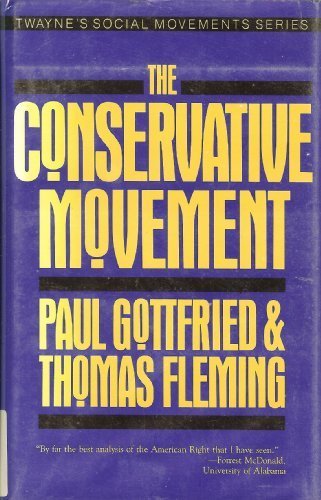I posted yesterday about the conservative thinkers Dennis Prager finds most profound.
I don’t find George Will and Charles Krauthammer profound, nor such publications as the Wall Street Journal and National Review, while Paul Johnson and Tom Sowell are hit and miss. Important intellectuals in my view include Steve Sailer, Paul Gottfried, and Christopher Caldwell. In my view, these dissident right intellectuals overwhelm the conservatives.
I love this bit from a book review today by Paul Gottfried: “…he suggests the hatred directed towards the Dissident Right is motivated by fear of the intellectual threat we represent.” Bingo!
When you compare the work of such thinkers as Steve Sailer and Dennis Prager whenever they tackle the same subject, there is no comparison in the profundity.
Paul Gottfried writes: Dr. George Hawley, [Email him] an assistant professor at the University of Alabama, has provided a badly-needed public service by producing Right-Wing Critics of American Conservatism. Hawley’s work, published by an outstanding press for American studies at the University of Kansas, should bring him much deserved attention….
Hawley in contrast devotes respectful attention to his subjects’ scholarship, which leaves the impression that he is truly struck by the force of their ideas. He even explores my sometimes (alas) abstruse tracts on German political thought and devotes considerable space to Carl Schmitt, Martin Heidegger and other mentors of the European New Right and its American disciples. In short, he suggests the hatred directed towards the Dissident Right is motivated by fear of the intellectual threat we represent.
 Hawley investigates in depth an in-house discussion about the paleoconservatism that had emerged in the 1980s and 1990s held between long-time Chronicles Editor Tom Fleming and myself. Fleming “argued that paleoconservatism is a continuation of the interwar old right, whereas Paul Gottfried viewed paleoconservatism as the true heir of the 1950s conservative movement before it was hijacked by neoconservatism.”
Hawley investigates in depth an in-house discussion about the paleoconservatism that had emerged in the 1980s and 1990s held between long-time Chronicles Editor Tom Fleming and myself. Fleming “argued that paleoconservatism is a continuation of the interwar old right, whereas Paul Gottfried viewed paleoconservatism as the true heir of the 1950s conservative movement before it was hijacked by neoconservatism.”
My views have changed since then. I now think the paleos were largely a new movement of the Right born of a lost cause, trying to counter the rise of neoconservatives to a position of control over the Conservative Movement. But though the paleos gave it their best shot, they went nowhere as a counterforce after the defeat of Pat Buchanan’s briefly successful presidential runs in 1992, 1996, and 2000.
Hawley ascribes the view that “paleoconservatism is no longer a meaningful force in the United States’’ to me, and I won’t deny it. He says there are two reasons for paleoconservatism’s eclipse: first, the passing of the generation that identified with it and its defeat in trying to take back the movement; and second, the changing social and cultural face of America, which would be even less receptive to paleoconservatives than were the 1980s.
But that doesn’t mean the fight against Conservatism Inc. (and its neoconservative masters) is over. Both Hawley and I have discerned a new populist Right emerging, which focuses on the high costs of mass immigration and capitalizes on growing popular resentment against Leftist elites.
VDARE.com is obviously a part of this emerging political force. Peter Brimelow and VDARE.com are cited and Peter is singled out (not unfavorably) for his “scathing attacks on American immigration policy.” As a result, we are told, Peter “is no longer published in mainstream venues.”
Three other contributors to VDARE.com who have at least four pages lavished on them in Hawley’s study are: Steve Sailer, for his daring commentaries on sociobiology; John Derbyshire for his examinations of IQ differences and their effect on human behavior and professional achievements; and, well, me, for my studies on European political thought and for being a long-lived nuisance to the neocons. To his credit, Hawley reviews the purge of John Derbyshire by the shameful National Review with sympathy.
Donald Trump in the United States and the National Front in France are two examples of the emerging populist political force—sometimes called “National Conservatism.” In the present historical circumstances, a coalition of the dispossessed, built on the white working class is probably the best the Right can hope for. Hawley is already at work on a sequel dealing with this alternative, populist Right. From having seen his prospectus, I expect it to be entirely on target.
